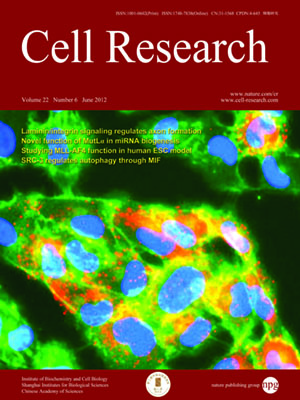
Volume 22, No 6, Jun 2012
ISSN: 1001-0602
EISSN: 1748-7838 2018
impact factor 17.848*
(Clarivate Analytics, 2019)
Volume 22 Issue 6, June 2012: 986-1002
ORIGINAL ARTICLES
A human ESC model for MLL-AF4 leukemic fusion gene reveals an impaired early hematopoietic-endothelial specification
Clara Bueno1, Rosa Montes1, Gustavo J Melen1, Verónica Ramos-Mejia1, Pedro J Real1, Verónica Ayllón1, Laura Sanchez1, Gertrudis Ligero1, Iv&
1GENyO (Pfizer-University of Granada-Andalusian Government Centre for Genomics and Oncological Research), Avda de la Ilustración 114, 18007 Granada, Spain
2Cancer Epigenetics Laboratory, Instituto Universitario de Oncología del Principado de Asturias, HUCA, Universidad de Oviedo, 33006 Oviedo, Spain
3Department of Immunology and Oncology, Centro Nacional de Biotecnolog韆/CNB-CSIC, Cantoblanco, 28049 Madrid, Spain
4Centro de Investigaci髇 Principe Felipe, Valencia, Spain
Correspondence: Clara Bueno, Pablo Menendez,(clara.bueno@genyo.es; pablo.menendez@genyo.es)
The MLL-AF4 fusion gene is a hallmark genomic aberration in high-risk acute lymphoblastic leukemia in infants. Although it is well established that MLL-AF4 arises prenatally during human development, its effects on hematopoietic development in utero remain unexplored. We have created a human-specific cellular system to study early hemato-endothelial development in MLL-AF4-expressing human embryonic stem cells (hESCs). Functional studies, clonal analysis and gene expression profiling reveal that expression of MLL-AF4 in hESCs has a phenotypic, functional and gene expression impact. MLL-AF4 acts as a global transcriptional activator and a positive regulator of homeobox gene expression in hESCs. Functionally, MLL-AF4 enhances the specification of hemogenic precursors from hESCs but strongly impairs further hematopoietic commitment in favor of an endothelial cell fate. MLL-AF4 hESCs are transcriptionally primed to differentiate towards hemogenic precursors prone to endothelial maturation, as reflected by the marked upregulation of master genes associated to vascular-endothelial functions and early hematopoiesis. Furthermore, we report that MLL-AF4 expression is not sufficient to transform hESC-derived hematopoietic cells. This work illustrates how hESCs may provide unique insights into human development and further our understanding of how leukemic fusion genes, known to arise prenatally, regulate human embryonic hematopoietic specification.
Cell Research (2012) 22:986-1002. doi: 10.1038/cr.2012.4; published online 3 January 2012
FULL TEXT | PDF
Browse 2200


